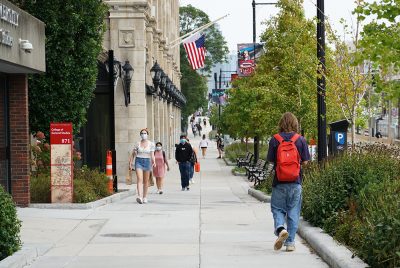
As the first hybrid teaching semester under Boston University’s Learn from Anywhere program draws to a close, students are looking to the future and contemplating adjusting their plans after Winter Intersession.
Some students plan to continue in-person learning in the Spring, while others will resume their education remotely as COVID-19 case numbers continue to rise statewide.
Melena Rodriguez, a sophomore in the College of Communication, said she did not expect BU to stay open for the duration of this semester when she returned for in-person learning in Fall.
“I thought by mid-October we were going to go home,” Rodriguez said, “so I packed light and everything.”
Next semester, Rodriguez said she plans to continue living in her on-campus residence and attending classes in person.
“Contrary to popular belief, I actually really enjoyed this semester,” Rodriguez said. “I was on a floor with some of my friends, which I very much enjoyed, and so I think that’s kind of what made this year for me.”
Rodriguez said she appreciates the measures BU has taken to instate COVID-19 safety precautions for students on campus, which has played a role in her decision to stay.
“Because I did feel safe this semester,” Rodriguez said, “I think that’s a big part of the reason why I plan on coming back next semester, too.”
Jessica Wong, a freshman in the College of General Studies, said she will be moving to campus in the Spring to start her college career.
“The main reason why I want to come in person is to at least have some sort of a normal college experience,” Wong said, “and just to explore Boston and take some classes in person.”
Wong said she would remain home if coronavirus cases became “really high,” or if state officials declared it unsafe for universities to remain open.
“If BU still says that it’s okay for us to come to campus,” Wong said, “then I trust BU’s judgment.”
LfA is not an ideal start to her college experience, Wong said, but she is hopeful about the future.
“It definitely feels a little weird,” Wong said. “Right now, that’s the situation, but it’ll be over soon, so just got to keep going with it.”
College of Arts and Sciences sophomore Julian Tanja, an international student, said he stayed home in Indonesia this semester because his parents believed he was safer there after observing how the United States handled the pandemic.
Tanja said he currently plans to return for the Spring semester, despite some reservations.
“I still have my flight tickets booked, so I’m most probably coming back,” Tanja said. “But I’m already starting to have second thoughts because a lot of the U.S. cases, it’s a lot worse now than before.”
He would be more confident if cases in BU and Boston decreased, Tanja said.
This semester has been difficult for Tanja, he said, because many of his friends are American and had returned to campus this Fall.
“I definitely did feel a lot of fear of missing out, although there’s actually nothing really much to miss,” Tanja said. “But then, it’s still the experience of meeting your friends in person is way better than having to meet with them over Zoom.”
Tan Anh Tran, a sophomore in the Questrom School of Business, said he stayed home in Vietnam out of concerns over travel restrictions as well as rising U.S. infection numbers. He added his LfA experience has not been the best.
“Obviously, I’ve missed out on the experiences that I would have gained from college,” Tran said, “because I’d say online classes haven’t been so helpful for me because of time zone differences and I know I’m not the only one.”
Tran said he had signed a lease for an apartment this year that he has had to bear the cost of while living in another country. He found a subletter, but rent has continued to impose a burden on him.
“It’s quite late notice and they’re university students, so I’m only letting them bear 50 percent of my rent,” Tran said. “I’m paying the other 50 and then they pay the utilities.”
Despite this, Tran said, he will continue studying remotely during the Spring because if he might not be able to afford fees in the event he is hospitalized in the U.S.
CAS senior Maneesha Khalae said she returned to Malaysia last Spring and stayed there this semester out of fear that restrictions might prevent her from traveling home from the U.S. later on.
After winter break, Khalae said, she plans to return to campus for her final semester — despite new COVID-19 case numbers not decreasing — to avoid time zone issues and to obtain Optional Practical Training authorization, which grants F-1 visa students up to 12 months of employment while obtaining their degree. She said this is not what she envisioned her final year to look like.
“It sucks because it’s your senior year,” Khalae said, “and nobody wants to spend senior year in their bedroom Zooming with everyone.”
The Spring semester experience with online learning prepared her for Fall, Khalae said, adding she has more sympathy for those who have just entered college.
“I feel really bad for freshmen that are missing out on their college experience and all that,” Khalae said. “It’s so hard to make friends when all you’re doing is spending time six feet away from people.”




